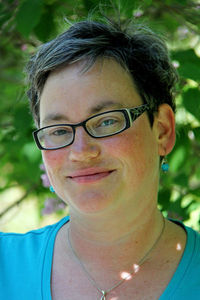Rachel Lebowitz on Her New Favourite Writer, Wuthering Heights, and the Strangest Book She Ever Read
A year with no summer might sound like a fable dreamt up by C.S. Lewis, but in 1816 it actually happened. The eruption of Indonesia’s Mount Tambora in April of 1815 so disrupted the atmosphere that global weather patterns were temporarily effected, resulting in snowstorms in what should have been summer. With this nightmarish disruption came food shortages, epidemics, and the proliferation of opportunistic cults.
From this stranger than fiction premise sprang The Year of No Summer (Biblioasis) by Rachel Lebowitz. In linked essays, Lebowitz takes readers viscerally into the experience of the apocalyptic year and how terrible and bizarre it was for those who experienced it. She creatively weaves in history and even memoir to make sense of what happened, examining the human appetite for destruction and survival, the search for meaning in crisis, and our relationship with the natural world. The Year of No Summer is a unique book in the best sense and one that will stay with readers long after the pages are closed.
We're pleased to welcome Rachel to Open Book today to talk about the books that have stayed with her (and more) as part of our WAR: Writers as Readers series. She tells us about her new favourite writer (whose work you'll want to rush out and get after Rachel's recommendation), her book club's creative selection criteria, and the strangest book she ever read.
The first book I remember reading on my own:
L. Frank Baum's The Wizard of Oz, when I was six. I didn't understand most of it (the monkeys were particularly confusing). I remember staying up late to finish it though and being so proud.
A book that made me cry:
The endings of Teju Cole's Every Day is for the Thief and Uwe Timms' In My Brother's Shadow: A Life and Death in the SS. Jenny Erpenbeck's The End of Days. Eula Biss' Notes from No Man's Land. Kathleen Jamie's Sightlines. I cry a lot.
The book I have re-read many times:
Emily Bronte's Wuthering Heights. I first read it as a teenager and decided to memorize various (romantic?) passages in it. I started off seeing it as a love story (ugh) and then moved on to seeing it as a story of imperialism and revenge.
The best book I read in the past six months:
Jenny Erpenbeck's The End of Days (translated by Susan Bernofsky). I also loved Visitation. She's my new favourite writer. The End of Days is so well done – I just can't get over it. It's the story of Europe in the 20th Century. The main character starts off as a baby and the book ends with her as an old woman, but at the end of every section, she dies. Then there are these interludes that imagine if that circumstance that caused her death didn't actually occur, so you see this girl grow up. But at the same time, you can't stop remembering her deaths. So the whole time I was reading I was holding two contradictory truths in my head. Added to that, the prose itself is gorgeous – clean and with a punch to your gut.
The book I plan on reading next:
Carson McCullers' The Heart is a Lonely Hunter, for Book Club. I started a book club 6 years ago. The rule is we have to read something that is at least 50 years old. It's been great. I'm looking forward to this one. Of hers, I've only read The Member of the Wedding, which I love. Its first paragraph is amazing.
My go-to recommendation when someone asks for something great to read:
It varies! I recently finished David Chariandy's Brother and it was really powerful and evocative. The ending was perfect.
The strangest book I've ever read and how I felt about it:
Jane Bowles' Two Serious Ladies. It has the inner logic of a dream - or it's a ramshackle building that you think is going to fall down but somehow, beyond all expectations, it manages to stay up. It wasn't easy to read. I've never felt the desire to reread it. I'm not sure I could even say that I enjoyed it, but I still think about it and I read it years ago now! “You have no imagination, she said, none whatever! You are missing everything. Where do I pay my bill?”
Your CanLit News
Subscribe to Open Book’s newsletter to get local book events, literary content, writing tips, and more in your inbox
A book I loved that I think has been overlooked:
Not a book, but I think Robert Louis Stevenson's prose style is under-rated.
___________________________________
Rachel Lebowitz, the author of Hannus (Pedlar Press, 2006), was shortlisted for the 2007 Roderick Haig-Brown Regional Prize (BC Book Prize) and the Edna Staebler Award for Creative Non-Fiction. She is also the co-author, with Zachariah Wells, of the children’s picture book Anything But Hank!(Biblioasis, 2008, illustrated by Eric Orchard) and Cottonopolis (Pedlar Press, 2013). She lives in Halifax, where she coordinates adult tutoring programs at her neighbourhood library.



